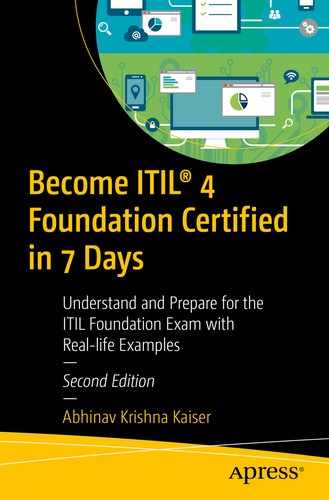ITIL 4’s masterstroke is to introduce practices in ITIL and do away with processes and functions. The problem was not so much that it was complex, but the underlying concepts and their overlay were often complicated; and to ITIL seekers, it was often a fairly lengthy learning curve.
ITIL’s processes represented the series of activities and its workflow that was necessary to turn an input into an output. Functions were team structures that provided the resources for carrying out process activities. Practices and functions engaged in a matrix arrangement where processes called on different functions to carry out process activities. In the current ITIL, both the ITIL processes and functions are put together to work in unison as a practice.
A practice is defined as a set of organizational resources designed for performing work or accomplishing an objective. It is based on a set of organizational resources (four dimensions of service management; Chapter 4) that could be people, infrastructure, software, or processes, and all these resources are aligned/designed in order to achieve a specific objective. The keyword is a specific objective, and not general. If you put together a practice for making burgers, it does not put together anything other than burgers. If you want a burrito, then you need a different practice for it.
This is a chapter that introduces the category of practices and the individual practices that are a part of it. Details of practices that are in scope will be taken up in the rest of the chapters.
Category of Practices
Recall that practices are an integral part of the service value system (Chapter 5). Every practice supports multiple value chain activities, and it includes resources based on the four dimensions of IT service management.
- 1.
General management practices
- 2.
Service management practices
- 3.
Technical management practices
Practices that are generic in nature that fall under the domain of general business management but could work with service management as well are categorized under general management practices.
Practices that are used primarily in the service management industry come under service management practices.
Technology practices find a home in service management through technology oriented organizations.
General Management Practices
ITIL Definition of General Management Practices
General management practices have been adopted and adapted for service management from general business management domains.
- 1.
Architecture management
- 2.
Continual improvement
- 3.
Information security management
- 4.
Knowledge management
- 5.
Measurement and reporting
- 6.
Organizational change management
- 7.
Portfolio management
- 8.
Project management
- 9.
Relationship management
- 10.
Risk management
- 11.
Service financial management
- 12.
Strategy management
- 13.
Supplier management
- 14.
Workforce and talent management
In the course for the ITIL Foundation exam, the Continual Improvement, Information Security Management, Relationship Management, and Supplier Management practices are in scope .
Service Management Practices
ITIL Definition of Service Management Practices
Service management practices have been developed in service management and ITSM industries.
- 1.
Availability management
- 2.
Business analysis
- 3.
Capacity and performance management
- 4.
Change control
- 5.
Incident management
- 6.
IT asset management
- 7.
Monitoring and event management
- 8.
Problem management
- 9.
Release management
- 10.
Service catalogue management
- 11.
Service configuration management
- 12.
Service continuity management
- 13.
Service design
- 14.
Service desk
- 15.
Service level management
- 16.
Service request management
- 17.
Service validation and testing
In the course for the ITIL Foundation exam, the change control, incident management, IT asset management, monitoring and event management, problem management, release management, service configuration management, service desk, service level management, and service request management practices are in scope .
Technical Management Practices
ITIL Definition of Technical Management Practices
Technical management practices have been adapted from technology management domains for service management purposes by expanding or shifting their focus from technology solutions to IT services.
- 1.
Deployment management
- 2.
Infrastructure and platform management
- 3.
Software development and management
Deployment management is in the scope of this book .
Knowledge Check
- 7-1.Which of the following practices does not figure in the technical management practices?
- A.
Deployment management
- B.
Release and deployment management
- C.
Infrastructure and platform management
- D.
Software development and management
- A.
- 7-2.Which of the following statements are true?
- A.
Service management practices were bred in service management organizations and were adopted and adapted into ITIL.
- B.
Service management practices were the best practices from the hospitality and service industry.
- C.
Service management practices were developed by ITIL authors and were adapted and adopted by service management organizations.
- D.
Service management practices were de facto standards in most organizations before they were documented as ITIL.
- A.
- 7-3.Which of the following practices do not feature under general management practices?
- A.
Portfolio management
- B.
Programme management
- C.
Project management
- D.
Risk management
- A.
